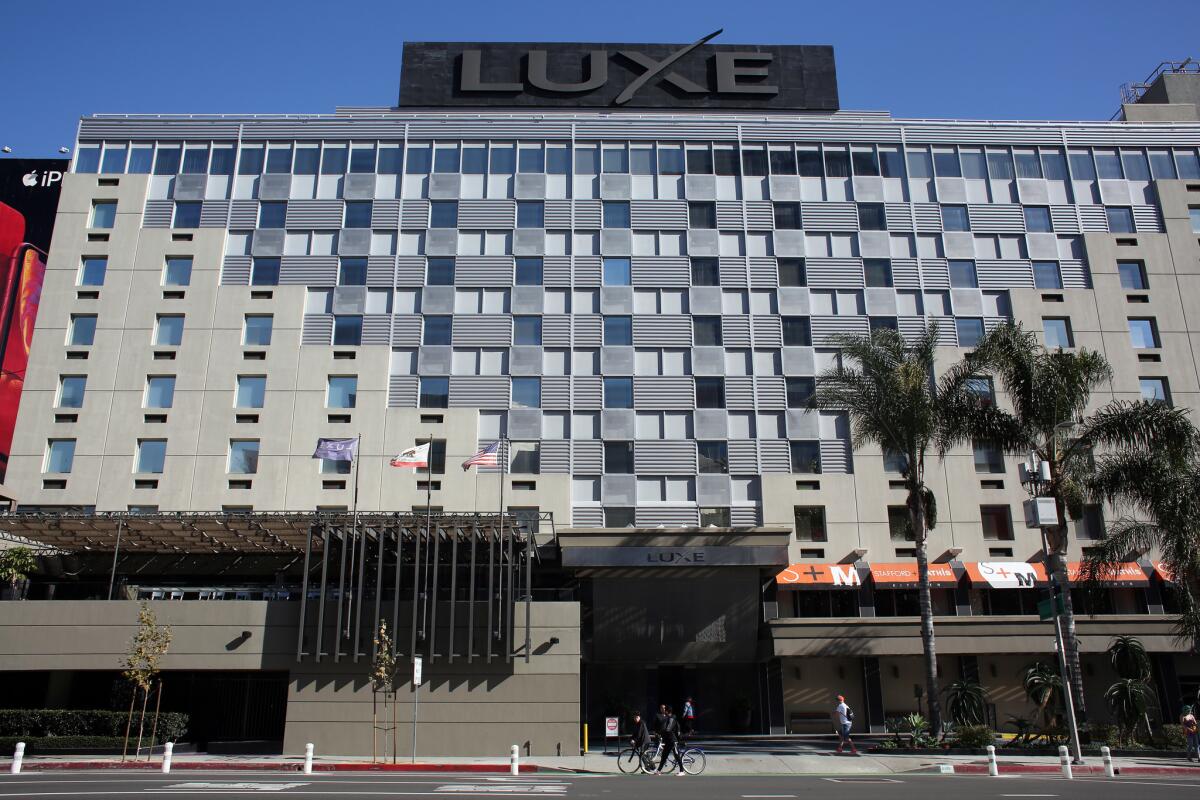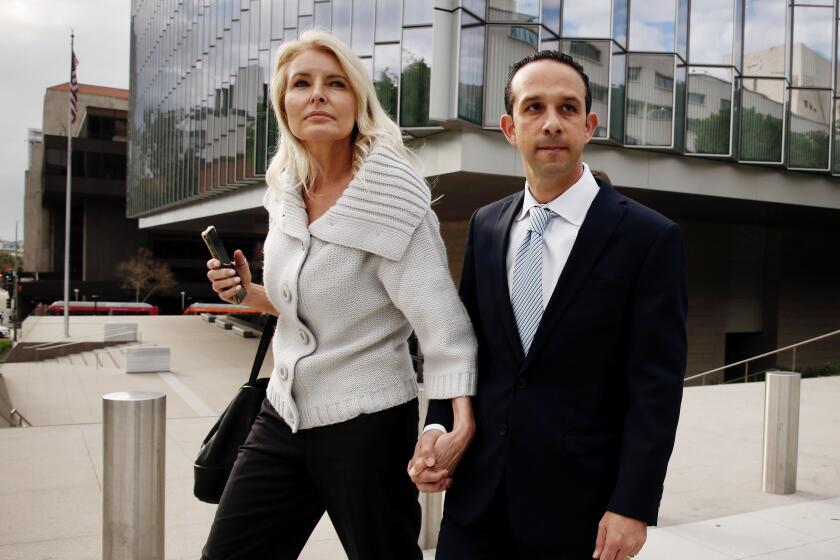L.A. City Hall corruption: Consultant agrees to plead guilty in bribery scheme
- Share via
A real estate consultant has agreed to plead guilty to a racketeering charge in the ongoing federal pay-to-play corruption probe at Los Angeles City Hall, federal prosecutors said Wednesday.
George Chiang, 41, of Granada Hills, will admit to playing a lead role in a scheme in which a Chinese real estate company allegedly bribed a Los Angeles City Council member in exchange for help on a major development project, according to a plea agreement between Chiang and federal prosecutors.
Court documents describe George Chiang’s role in a pay-to-play scheme at Los Angeles City Hall.
Under the agreement, which was made public Wednesday, Chiang will fully cooperate in the government’s ongoing investigation into cash payments, air travel, free tickets and other perks prosecutors say were provided to the council member and other city officials.
The plea agreement and charging documents also detail years of secret negotiations between Chiang, the unnamed council member and other participants. Their scheming, the government alleged, amounted to a criminal conspiracy that violated the Racketeer Influenced and Corrupt Organizations Act, a legal cudgel favored by prosecutors in criminal cases because of the hefty prison sentences it can carry.
An attorney for Chiang, Stanley Friedman, said his client regrets his “obviously very serious conduct.”
“He’s met with the FBI. He’s met with the U.S. Attorney’s Office,” Friedman said. “He’s agreed to be called upon, to the extent that they need any additional information as part of their investigation.”
As L.A. officials battle the coronavirus pandemic, a corruption scandal has fueled mistrust in City Hall.
A court hearing for Chiang to plead guilty has not yet been scheduled. He faces up to 20 years in prison, but is likely to receive a far lighter sentence, especially if, in cooperating with prosecutors, he provides useful information.
The case against Chiang is certain to ratchet up pressure on Councilman Jose Huizar. Although prosecutors have not named him, details in the filings against Chiang and in previous cases have made clear Huizar is the councilman at the heart of the City Hall probe. Huizar’s attorney, Vicki Podberesky, declined to comment.
At the center of the allegations against Chiang is a downtown development proposal sought by a Chinese real estate company. Although prosecutors did not name the project, details in the filing make clear it is the planned redevelopment of the Luxe City Center Hotel on Figueroa Street, across from the L.A. Live entertainment complex.
Chiang, who previously had worked as a real estate broker in the San Gabriel Valley, signed on as a consultant with the developers. Although it is not named in court records, the company pursuing city approval for the Luxe project was Shenzhen Hazens.
Over the years that followed, according to court records, Chiang worked on behalf of the company to help orchestrate an elaborate array of bribes meant to win the council member’s support for the project. As the head of the planning committee, which reviewed major development projects, and as the representative of downtown, the council member wielded enormous power over the project’s fate.
Through Chiang, the company allegedly funneled monthly payments totaling $66,000 to an associate of the councilman as it sought approval for a redevelopment project with 650 homes and 300 hotel rooms. Prosecutors alleged the money was cloaked as consulting fees and was paid through a complex arrangement involving a relative of the real estate company’s chairman.
George Chiang agreed to plea guilty on a racketeering charge in the ongoing federal pay-to-play corruption probe at Los Angeles City Hall.
The company represented by Chiang also pledged to provide $100,000 to a political action committee that was expected to support the campaign of the council member’s relative, the filing states. In 2018, Huizar was working to have his wife, Richelle Huizar, replace him on the council, raising money on her behalf.
Over breakfast at a Boyle Heights restaurant, the council member told Chiang and his business partner that he needed the donation “as soon as possible,” prosecutors said. That way, when she announced her candidacy, she would have money pour into the campaign and “scare everyone else from running against her,” the council member said, according to the filing.
Chiang also arranged for the council member and his family members to take a trip to China, where they visited the chairman of the company seeking approval of the hotel and residential project, according to prosecutors. He also paid approximately $1,000 for alcohol for a party for a relative of the council member, as well as concert and Lakers tickets, prosecutors said.

The effort paid off, according to prosecutors. In exchange for bribes, the council member pushed the hotel project through the planning committee. In December 2017, the full council approved the development.
The plea agreement and accompanying documents shed new light on another figure in the probe, who left City Hall three years ago. Although he is not named in the filing, biographical information provided by prosecutors made clear that the figure is Raymond Chan, a former deputy mayor to Mayor Eric Garcetti.
While working in Garcetti’s office, Chan reached an agreement with Chiang to get paid to push the hotel and residential project through the city’s approval process, according to the details in the filing. The money did not arrive until later in the year, prosecutors said.
Prosecutors said the deputy mayor used his official position to “pressure subordinate city officials to take favorable official actions” on the hotel project. At one point, the official met with a member of the City Planning Commission, whose members are appointed by Mayor Eric Garcetti and vet major development projects, to urge the project’s approval, the filing states.
In June 2017, the deputy mayor asked Chiang for his “20 grand” in cash and Chiang responded, “I got it sitting in the car,” according to the plea agreement documents.
The deputy mayor told Chiang to “keep it there for now,” the filing states.
Chan retired from the city roughly a week later. He received $112,000 from Chiang’s company in 2017 — money described by prosecutors as compensation for shepherding the project through City Hall while working in Garcetti’s office.
Chan did not respond to phone messages seeking comment Wednesday. But Garcetti said the allegations, if true, soil “everybody here at City Hall.”
“If he or anybody else has broken the law, I hope they get the full extent of punishment from the law as well,” the mayor said.
Chiang is the third person in the City Hall corruption case to agree to plead guilty over the past two months.
Former Los Angeles City Councilman Mitchell Englander agreed to plead guilty to scheming to falsify facts in a probe of his acceptance of envelopes of cash and other gifts. In addition, former City Planning Commissioner Justin Jangwoo Kim agreed to plead guilty to bribery in a case involving a real estate developer and a paper bag containing $400,000.
More to Read
Sign up for Essential California
The most important California stories and recommendations in your inbox every morning.
You may occasionally receive promotional content from the Los Angeles Times.














